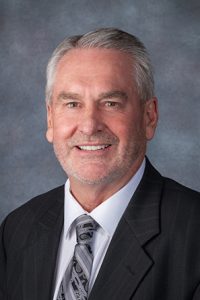Bill would prohibit minors from attending drag shows
The Judiciary Committee heard testimony March 24 on a proposal that would prohibit a minor under the age of 19 from attending a drag show in Nebraska.

LB371, introduced by Glenvil Sen. Dave Murman, defines a drag show as a performance in which a performer exhibits a gender identity different from their gender assigned at birth using clothing, makeup or other physical markers and the performer sings, lip syncs, dances or otherwise performs for an audience.
In addition to prohibiting a minor from attending a drag show, the bill would add a criminal penalty for an individual who brings a minor to a drag show that would result in a Class I misdemeanor charge, which carries a maximum sentence of one year in jail and a $1,000 fine.
The bill also states that no individual under age 21 would be allowed to attend a drag show if alcoholic liquor is served. Additionally, a state agency could not use state funds to host a drag show under the bill.
Any business, establishment or nonprofit that violates these provisions would be fined $10,000 under the bill and an owner or officer of an entity that hosts a drag show and knowingly violates these provisions would face a Class I misdemeanor charge.
Murman brought an amendment to the hearing to specify that a minor would be prohibited from attending a show in which a drag artist is “engaged in adult entertainment” while exhibiting a gender identity different from their gender assigned at birth and using clothing, makeup or other physical markers while performing.
Murman said the bill was based largely on several occurrences in Nebraska, including Drag Story Hour, where children were present at drag shows that he said included sexualized behavior and dancing. The role of the government is to protect children, Murman said, and LB371 would ensure that children are not introduced to sexual and inappropriate behavior.
“Inappropriate content is becoming more prevalent,” Murman said. “It is not socially acceptable for children and the state of Nebraska needs to make that very clear.”
Testifying in support of the bill was Angie Eberspacher. Drag shows are used to indoctrinate children to queer theory, she said, and “drag pedagogy” is an effort to reformulate a child’s relationship to sex and sexual identity.
“Queer theory is here. It’s creeping into our schools, museums and hospitals,” Eberspacher said. “We must recognize the difference between adult sexuality and childhood innocence.”
Also in support was Keely Pagel. Children are intellectually distinct from adults, she said, and drag, as a genre, has very little benefit to children.
“Children do not have the capacity or the frame of reference to process experiences like adults do,” Pagel said. “While behaviors associated with drag may be considered acceptable in adult-only venues, these same behaviors are often listed as grooming techniques by child advocacy organizations.”
Katie Kilian, who identified as a transgender woman, spoke in opposition to the bill. LB371 suggests that queer people who perform at drag shows are inherently sexual and a danger to children, she said, which is not the case.
“What this bill will do is make it harder for kids to find positive representations of gender non-conforming people,” Kilian said. “Kids shouldn’t have to grow up feeling it’s shameful to be queer. Our art and our culture are not inherently sexual and our bodies are not lewd.”
Also in opposition was Dylan Seaman of Lincoln. LB371 would give broad authority to criminalize trans and gender non-conforming people in Nebraska, she said, and would label those in the LGBTQIA community as inherently dangerous to children.
“Like any live performance or form of media, drag can be family-friendly or adult oriented,” Seaman said. “It is the responsibility of venues, performers and parents to ensure children are not subjected to inappropriate content.”
Abbie Swatsworth, executive director of OutNebraska, testified in opposition to the bill. The underlying intent of the measure is to erase drag and trans people in Nebraska, she said, and it emboldens hateful rhetoric and action against these communities.
“Drag is art. Drag is free speech. Drag Story Hour is about kindness and empathy,” Swatsworth said. “Drag is a community for families who want their children to explore their imagination and feel safe expressing themselves.”
John Coleman, representing the Foundation for Individual Rights in Education, spoke against the proposal. The definition of drag show, as written in the bill, is overbroad, he said, and unconstitutionally targets expression based on viewpoint.
“As currently written, the bill’s definition … would cover musical [productions] … as well as traditional Shakespeare performances and other entertainment simply for depicting non-gender conforming characters,” Coleman said. “Broad definitions … that do not distinguish between protected and non-protected forms of expression are unconstitutional.”
The committee took no immediate action on LB371.

